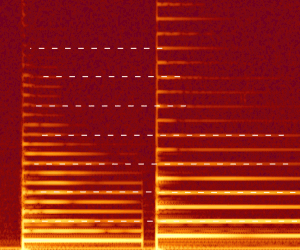String resonance
String resonance occurs on string instruments. Strings or parts of strings may resonate at their fundamental or overtone frequencies when other strings are sounded. For example, an A string at 440 Hz will cause an E string at 330 Hz to resonate, because they share an overtone of 1320 Hz (3rd overtone of A and 4th overtone of E).
Electric guitars can have string trees near the tuning pegs to mute this type of reverberation. The string length behind the bridge also must be as short as possible to prevent the resonance. String resonance is a factor in the timbre of a string instrument. Tailed bridge guitars like the Fender Jaguar differ in timbre from guitars with short bridges, because of their (extended) floating bridge. The Japanese Koto is also an example of an instrument with occurring string resonance.
String resonance in instrument building
Sometimes string resonance is used in the construction of the instrument, like for instance the Sympathetic strings in many Eastern instruments.
Piano
According to a 2007 Grove Music Online article on "duplex scaling", Steinway developed a system of Aliquot stringing to provide sympathetic resonance, with the intention of enriching the treble register of the piano. In the "octave duplex" piano by Hoerr of Toronto, each note had four strings, of which two, three or four could be struck by the hammer depending on the depression of any of four pedals. Steinway’s duplex scale was inspired a half-century earlier by an experiment conducted by the German piano maker Wilhelm Leberecht Petzoldt, in which a small bridge was placed behind the standard larger one with the intention of maximizing the potential additional resonance of a sympathetically vibrating additional length of string.
Overtones due to string resonance on the koto
The following table[1] [2] shows the created resonating overtones on the koto for various positions on a stopped string (the proportion being between the "played" portion of the string and resonant portion, the remaining length of the string).
| Resonating string
length/Played string |
resonating harmonic | cents | reduced cents |
|---|---|---|---|
| 1/1 | P0 | 0.0 | 0.0 |
| 8/9 | Just major tone | 203.9 | 203.9 |
| 7/8 | Septimal major second | 231.2 | 231.2 |
| 6/7 | Septimal minor third | 266.9 | 266.9 |
| 5/6 | Just minor third | 315.6 | 315.6 |
| 4/5 | Just major third | 386.3 | 386.3 |
| 3/4 | perfect fourth | 498.0 | 498.0 |
| 2/3 | P5 | 702.0 | 702.0 |
| 3/5 | Just major sixth | 884.4 | 884.4 |
| 1/2 | P8 | 1200.0 | 0.0 |
| 2/5 | P8 + just M3 | 1586.3 | 386.3 |
| 1/3 | P8 + P5 | 1902.0 | 702.0 |
| 1/4 | 2P8 | 2400.0 | 0.0 |
| 1/5 | 2P8 + just M3 | 2786.3 | 386.3 |
| 1/6 | 2P8 + P5 | 3102.0 | 702.0 |
| 1/7 | 2P8 + septimal m7 | 3368.8 | 968.8 |
| 1/8 | 3P8 | 3600.0 | 0.0 |
| 1/9 | 3P8 + pyth M2 | 3803.9 | 203.9 |
| 1/10 | 3P8 + just M3 | 3986.3 | 386.3 |
| 1/11 | 3P8 + just M3 + GUN2 | 4151.3 | 551.3 |
| 1/12 | 3P8 + P5 | 4302.0 | 702.0 |
| 1/13 | 3P8 + P5 + T23T | 4440.5 | 840.5 |
| 1/14 | 3P8 + P5 + septimal m3 | 4568.8 | 968.8 |
| 1/15 | 3P8 + P5 + just M3 | 4688.3 | 1088.3 |
| 1/16 | 4P8 | 4800.0 | 0.0 |
Instruments that use string resonance
- Banjo
- Baryton
- Bazantar
- Crwth
- Dilruba
- Esraj
- Fender Jaguar
- Fender Jazzmaster
- Gadulka
- Gottuvadhyam
- Hardingfele
- H'arpeggione
- Kithara (of Harry Partch)
- Koto
- Modern versions of the nyckelharpa
- Mohan veena
- Moodswinger
- Moonlander
- Pencilina
- Piano (damper pedal)
- Prepared guitar
- Prepared piano
- Rubab
- Sarangi
- Sarod
- Setar
- Sitar
- Springtime
- Tambura
- Tar (lute)
- Ten-string guitar
- Twister
- Ukelin
- Viola d'amore
